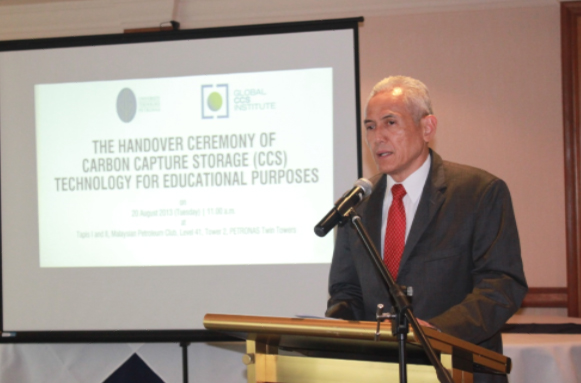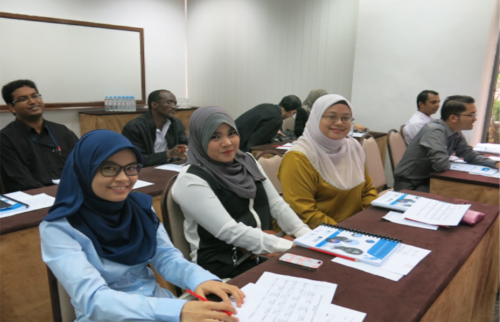Insights and Commentaries
Successful introduction of CCS 101 course into Malaysian Universities
16th January 2016
Topic(s): Capacity development, Carbon capture, Public engagement, use and storage (CCUS)
The Global CCS Institute has partnered with four Malaysian Universities to offer formal training in carbon capture and storage (CCS). In this Insight the Institute's Principal Manager Capacity Development, Alice Gibson, reflects on the impact of the courses.
When Malaysia joined the Institute as a founding member back in 2009, the then Minister of Energy, Minister Chin, asked the Institute to run an introductory CCS workshop. Malaysia's Energy Ministry recognises the potential for CCS to play an important role in cutting carbon dioxide (CO2) emissions, and with this in mind has undertaken a range of capacity development initiatives over recent years. We have collaborated with the Malaysian Ministry of Energy, Green Technology and Water (KeTTHA), on many of these capacity development initiatives since 2009.
CCS 101
One capacity development initiative tailored to meet a request by Malaysian stakeholders was to introduce a CCS course into Malaysian Universities for graduate students enrolled in suitable masters degree courses. This ‘train-the-trainer’ initiative, as it became known, was aimed at up-skilling professors so they could in turn teach a CCS 101 course at their respective universities.
The Institute considered this to be a very robust, sustainable capacity development activity that would enable a CCS 101 course to be taught to the future professionals who will advance CCS in Malaysia, from a wide variety of relevant disciplines such as engineering and geoscience, and with the necessary practical and academic rigour demanded of masters qualifications. This initiative also enabled introductory CCS courses to be taught more frequently than would otherwise be the case, through what are inherently capacity-building organisations – universities.
Two participating universities are: the Universiti Tenaga Nasional (UNITEN) – which is the university owned by Malaysia’s major power utility, and the Institute of Technology PETRONAS (UTP) – which is owned by Malaysia’s oil and gas company. These universities have direct links with their parent companies, which are themselves very important stakeholders for future implementation of CCS in Malaysia.
Additionally, the National University of Malaysia (UKM) and the University of Technology Malaysia (UTM) also introduced CCS 101 courses as part of this capacity development initiative.
This initiative had two main components:
- A week-long ‘train-the-trainer’ course, taught in partnership with Australia’s CO2CRC, to up-skill professors and industry professionals. The first training course was held in July 2012, and a second course was held in August 2013. With relatively few operational CCS projects around the world in 2012/13, this introductory course enabled professors and industry professionals alike to gain access to the most up-to-date knowledge from the global CCS community, and to identify relevant information for their own curriculum and professional development respectively.
- The provision of educational materials for Malaysian universities to use in delivering the CCS course. This included a full suite of PowerPoint presentations on key CCS topics, as well as assignment and exam suggestions. By incorporating suggestions for evaluation and assessment, the Institute was able to help its Malaysian partners ensure that local students were considering the broad range of issues associated with CCS.
A review
Three years into the program, the initiative continues to help enhance awareness and understanding of CCS in future professionals, and the model continues to demonstrate its sustainability.
A few key statistics help to tell the story:
- The CCS 101 course has been provided as an elective for graduate students in relevant masters degree programs at all four universities, and was also open to undergraduate students at UTP.
- The course has been run three times at UNITEN; twice at UKM, once at UTP and once at UTM.
- To date, 72 students in total have taken the course at UNITEN, 37 have taken the course at UKM, 30 at UTP and 6 at UTM.
- At UNITEN and UKM, these totals include a proportion of international students (49% and 22% respectively), mostly from Middle Eastern countries such as Iraq, Iran, and Afghanistan.
- One of the UKM students went on to do their masters dissertation project on carbon capture, utilisation and storage (CCUS) in a Malaysian petrochemical complex.
The course coordinator at UKM, Dr Wan Mohd Faizal Wan Mahmood, has advised that the course presented a suitable challenge for the students as it covered many different aspects of CCS (not just engineering aspects). As with real-world CCS projects, the course covers a necessarily diverse range of subjects including carbon capture, transport, and storage, as well as introducing relevant economics, legal and regulatory issues and public engagement. Seeking data, particularly on site selection and public engagement, was especially challenging for the research assignments, and mirrored some of the challenges facing the wider CCS community. By the end of the course, most of the students enjoyed the elective course and agreed that it was an important topic.
UNITEN course coordinator, Dr Jagadeesh Pasupuleti, reported that the delivery of the course aligns with the university’s vision to be a leading global energy university that helps to shape a sustainable future. The university’s parent company is interested in reducing CO2 emissions from coal-fired power plants, and the introduction of a CCS course at masters level therefore plays an important role in human capacity development.
Dr Pasupuleti reported that the assignments required the students to undertake broader research on climate change as well as on CCS specifically, exposing them to these topics when they otherwise might not have been in their engineering degrees. Those UNITEN graduate students that already work in electricity companies or energy ministries found the course particularly exciting.
Has this capacity development initiative helped to raise awareness and understanding of CCS in future professionals?
Yes. To date, a total of 175 students in engineering and geo-science disciplines now have a good understanding of CCS because of the course, including a first-hand appreciation for some of the challenges facing professionals working on large scale integrated CCS projects around the world. This is an important stakeholder group to help bring CCS into the mainstream discussion of how best to utilise all available low-emission technologies, to help mitigate the effects of climate change.
Recent advances in CCS, and a growing portfolio of operational large-scale CCS projects around the world, are now providing these graduates with opportunities for long-term careers where they will continue to utilise and build upon their CCS knowledge. In particular, these universities are a key conduit into important organisations in Malaysia, such as Tenaga Nasional and PETRONAS.
Is the ‘train-the-trainer’ a sustainable model?
The model has worked particularly well in UNITEN and UKM, which has taught the course every year since they implemented it. All four universities have reported that they plan to run the course again, suggesting that the model is a sustainable one aligned to student demand for electives. This will ensure that up to date CCS technical education continues to reach a broad network of future professionals, helping both students and university academics to consider the value of CCS as part of the low emission portfolio of technologies. It's important to recognise that CCS electives at all four universities represent an introduction to important concepts, with ongoing opportunities for further learning essential to ensure continued professional development for those graduates who go on to work in the field.

Datuk Ir. (Dr) Abdul Rahim HJ Hashim, Vice Chancellor and CEO of Institute of Technology PETRONAS, thanking the Global CCS Institute at the Hand-over Ceremony of CCS educational materials to University of PETRONAS, August 2013.

Participants at the August 2013 ‘train-the-trainer’ course.